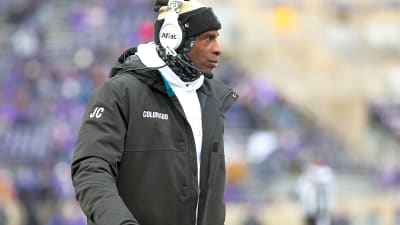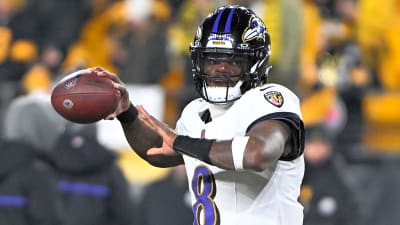
Repairing broken NFL coaching pipeline must start on offense
The changes the NFL made to the Rooney Rule this week will alter future coaching and front office interview practices. But based on the current landscape, the latest rule overhaul may not immediately result in the hiring of more minority coaches.
Teams with head-coaching vacancies are now mandated to interview two minority candidates. They are also required to conduct multiracial job searches to fill offensive and defensive coordinator roles, which should create more opportunities for minority position coaches. Tuesday’s change to the coordinator job circuit — with teams now unable to block under-contract position coaches from interviewing for coordinator jobs, so long as they come with play-calling responsibilities — will also fast-track the next wave of guru types of all races.
Because the vast majority of coaches in the NFL's top two offensive assistant positions are white, however, the problem of a lack of minority head coaches may take years to fix.
Of the 32 teams, 30 employ white offensive coordinators (or white head coaches who hold both titles) — a more lopsided split than the league's 28-4 white-to-minority head coach ratio. Since 2015, teams have combined to fill 83 offensive coordinator positions, with six going to minority candidates. And one of those (Edgar Bennett with the Packers in 2015) was a title bump that did not come with play-calling responsibilities.
This year, white assistants filled all 10 offensive coordinator vacancies. This mix of hires came from recently fired head coaches (Pat Shurmur in Denver, Jay Gruden in Jacksonville and Jason Garrett with the Giants), second-chance OCs (Bill Lazor in Chicago and Kevin O'Connell in L.A.), through the quarterback-coaching pipeline (Alex Van Pelt, Cincinnati and Scott Turner, Washington) and from the college ranks (Joe Brady, Carolina). Chan Gailey (Miami) and Gary Kubiak (Minnesota) are also former head coaches but had settled in as assistants in recent years.
The top OC-feeder job (quarterbacks coach) consists of nearly all white staffers as well. Thirty teams employ a white QBs coach or a coach who holds this responsibility, with the Colts’ Marcus Brady and Chargers’ Pep Hamilton representing the only minorities in these posts. Even when defensive and special teams coordinator positions are included, the NFL's five highest-profile coaching jobs currently feature an alarming 137-23 white/minority split.
Minority candidates’ pathways through today’s most popular route to head-coaching positions — the offensive innovator avenue — are nearly closed. The 2021 hiring period, then, should unearth new candidates of color (beyond Chiefs OC Eric Bieniemy, who seems a lock to land a job). With so few minority assistants in key positions on offensive staffs, teams must scour lower-profile nooks to find mandatory interviewees.
So now, teams searching for 2021's Sean McVay or Kyle Shanahan will enjoy freer rein to poach assistants. With white QB coaches dwarfing their minority peers in numbers, it is not hard to see them benefiting from the change first. This week’s adjustments should help overall, but true change will not happen until teams hire more offense-trained assistants of color.
The NFL has mostly afforded non-white coaches chances on the defensive side of the ball. Historically, of the 21 black or Latino coaches to be given HC opportunities — excluding Fritz Pollard, who coached briefly in the 1920s — six had offensive backgrounds. The Chargers' Anthony Lynn represents the only active minority head coach with an offensive-oriented skill set, and he enters 2020 on the hot seat.
This is not to say teams have definitively erred by not hiring minority coaches. Organizations are free to hire their preferred coach, but with defense-based candidates becoming less popular in recent years, the optics worsened. The 2019 offseason — when the Bengals, Broncos, Browns, Cardinals and Jets replaced black coaches with white candidates, four of whom brought expertise on the offensive side of the ball — crystallized the problem and likely accelerated this week’s changes.
In recent hiring periods, teams have increasingly coveted play-calling innovator types. White coaches — from the 49ers' Shanahan to the Rams' McVay to the Cardinals' Kliff Kingsbury to Patriots OC Josh McDaniels — have dominated this genre of candidate. Minority candidates, for the most part, have instead carried leadership appeal. The lack of diversity among the offensive coaching ranks helped shape these perceptions. But offense-geared skill sets might become even more popular thanks to Tuesday's change.
Teams being unable to block top assistants from interviewing for offensive coordinator jobs elsewhere may lead to franchises, for stability purposes, further prioritizing head-coaching candidates who call plays. Play-calling HCs represented both sides in Super Bowl LIV (Shanahan and Andy Reid), and the previous two NFC champions featured play-calling HCs (McVay, Doug Pederson). This is a good way to ensure continuity crucial to developing young quarterbacks, but such a trend could work against the group the NFL is trying to aid.
Thirty-one franchises feature white play-callers, with Reid primarily calling the Chiefs' plays over Bieniemy. Buccaneers OC Byron Leftwich is the league’s only minority offensive play-caller.
The NFL’s effort to increase diversity in front offices stands to help reshape coaching staffs to some degree. Only two GMs (the Dolphins’ Chris Grier and the Browns’ Andrew Berry) are black. But considering how desolate the most common routes to head-coaching positions are for minorities, the NFL could be battling this issue for some time.
While the head-coaching component of the new system will receive the most attention when certain teams conduct job searches next year, monitoring the offensive coordinator interview circuit will be critical. Observing how this landscape evolves will require a long-lens outlook, but this will be the area to study to determine if the NFL is genuine about repairing its broken coaching pipeline.
More must-reads:
- Ideal landing spots for intriguing NFL free agents
- 10 pivotal relationships for 2020 NFL season
- The 'Most seasons played by NFL team' quiz
Breaking News
Trending News
Customize Your Newsletter
 +
+
Get the latest news and rumors, customized to your favorite sports and teams. Emailed daily. Always free!







